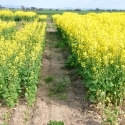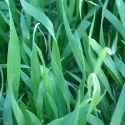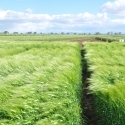Elevated Carbon Dioxide and wheat yield - the impact of climate change.
Growth, yield and photosynthetic responses to elevated CO2 in wheat genotypes
Rob Norton1,2, Saman Seneweera2, Sabine Posch2, Greg Rebetzke3, Glenn Fitzgerald4.
1 International Plant Nutrition Institute, 54 Florence St, Horsham, Victoria, Australia.
2 Department of Agriculture and Food Systems, Melbourne School of Land and Environment, The University of Melbourne, Private Box 260, Horsham, Victoria 3401, Australia.
3 CSIRO Plant Industry, PO Box 1600, Canberra ACT 2601, Australia
4 Victorian Department of Primary Industries, Private Bag 260, Horsham, Victoria, 3401, Australia.
Abstract
The Australian Grains Free Air Carbon Dioxide Enrichment project aims to measure the interactive effects of CO2 (ambient ~380 µmol/mol, elevated ~550 µmol/mol) with water, temperature and cultivar on wheat growth and productivity. Elevated CO2 increased crop biomass at maturity by 22% (2007), 31% (2008) and 32% (2009). Mean grain yield (2007-2009) increased under eCO2 from 2.52 t/ha to 3.22 t/ha. Sowing time and additional water affected growth and yield with the later sowing showing no response to eCO2 in 2008. In two of three years, kernel weight increased with e[CO2] although there was no consistent change in other yield components.
Source and sink differences were seen among wheat cultivars in a glasshouse study, but in the FACE experiment, there were few interactions between e[CO2] and cultivar. Kernel weight increased under eCO2 when free tillering types (Silverstar, 2009) were irrigated. These data suggest that both sink capacity and source activity will need to be combined to give cultivars that respond best to eCO2.




